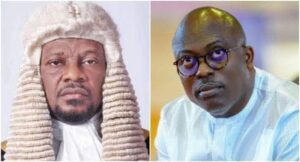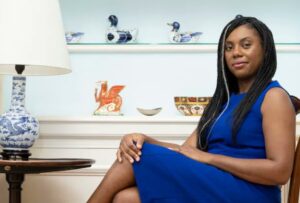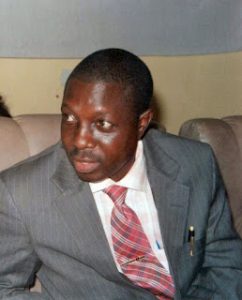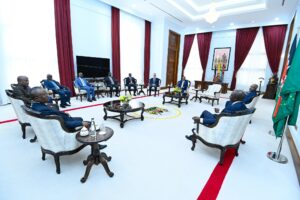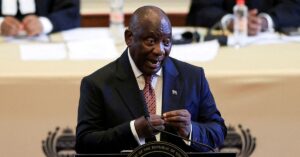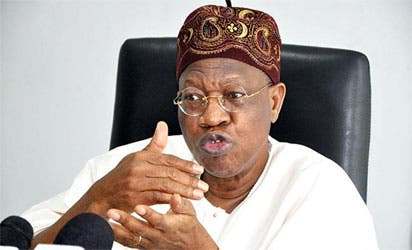
Let them hate me, as long as they fear me – Caligula, Roman Emperor (37 to 41 AD)
All through history, even with the advent of modernism, despots who hate the power of free speech always have their own version of repressive ancient monarchies’ abenilori. These were the ones entrusted with the task of beheading opponents, literally or metaphorically. While Robert Gabriel Mugabe of Zimbabwe had his in Minister of Information and Publicity, Jonathan Nathaniel Mlevu Moyo, President Muhammadu Buhari has Lai Mohammed, his Minister of Information and Orientation. History recorded that Mugabe’s Moyo lent himself as a tool in the hands of a man who became one of the most tyrannical Africans to sit in a Government House. In a full coercive capacity, he helped articulate Mugabe’s wave of oppression against Zimbabweans.
Five years younger than Mohammed, having been born in 1957, from 2000 to 2005 and 2013 to 2015, Moyo drafted and vociferously defended Mugabe’s tools of repression. These came in the form of Broadcasting Services Act (BSA) (2001), the Zimbabwe Broadcasting Corporation (Commercialization) Act (2003), the Access to Information and Protection of Privacy Act (AIPPA) (2002), the Public Order and Security Act (2002), and the Zimbabwe Broadcasting Corporation (Commercialization) Act (2003). All of these restrictive legislations were targeted at muzzling freedom of speech and attracted widespread criticisms for their violation of Zimbabweans’ rights to free speech. Upon being brought to the Zimbabwean parliament, Chairman of Zimbabwe’s Parliamentary Legal Committee, Dr. Eddison Zvobgo, repelled AIPPA thus: “I can say without equivocation that this Bill, in its original form, was the most calculated and determined assault on our liberties guaranteed by the Constitution, in the 20 years I served as Cabinet minister.”
So when Nigeria’s own Mugabe tool went the Zimbabwean route in a bill recently parceled to the national legislature seeking amendment to the Nigerian Broadcasting Commission (NBC) Act, so as to enable Mugabe – oh, my apologies, Buhari – control online media operations in Nigeria, it was obvious that, as physicists say, like was attracting like. Last week, the minister told the House of Representatives Committee on Information, National Orientation, Ethics and Values that he wanted the committee “to add that internet broadcasting and all online media should be included in the bill.” In the specifics he seeks, Mohammed wants NBC’s powers amended so that it can superintend over the licensing, registration and regulation of the social media. His morbid thirst for the blood of free speech is not done. He also wants the Press Council Act amended, as well as the Advertising Media Practitioners Council of Nigeria (APCON) code, all in the bid to place the media on the laps of government. And Mugabe smiled mischievously in his grave.
As Minister, Moyo turned pugilist against the Zimbabwean press, until he got expelled from the ZANU-PF. Beaming like a voyeur at the government closure of one of the most vociferous newspapers in Zimbabwe, he had remarked, “The Daily News is a victim of the rule of law which it had been preaching since 1999.” He was vilified in Zimbabwe and became as worthless as the country’s dollar, so much that, in 2005, Asher Tarivona Mutsengi, a student leader, journalist and agronomist at the Solusi University, described him thus: “…he will go down in the annals of history as a minister who lacked foresight and for pouring vitriol against his perceived opponents, his shopping spree in South Africa of scarce foodstuffs, causing unemployment to a multitude of journalists and a penchant for uncivilized propaganda.” Mutsengi poured the last vitriol: “…my final analysis is that he is heading for the precipice… He might be a spin-doctor and intelligent as some claim, but I don’t subscribe to that myself.”
The United States was so chagrined by his role in the muzzling of free speech that it banned him from travelling to America. When in January, 1998, Moyo moved to South Africa’s University of Witwatersrand to work on a W.K. Kellog Foundation-sponsored project entitled The Future of the African Elite, the university later alleged that he eloped with a chunk of the research grant totaling 100 million rand. It got so bad that younger brother of President Thabo Mbeki, Moeletsi of Witwatersrand university, led a campaign to have Moyo jailed if he ever stepped his feet on the South African soil.
Scholars have established that there are two models of leadership that exist in Africa. First is one that swivels from benevolence to repression. The second begins as a dictatorship and significantly graduates into heroism. I add a third and the fourth: a leadership that begins as dictatorship and enjoys this sadism’s bumpy ride till its last day in office. The last is one that begins benevolently and never departs from this highway. Two African Heads of State personify the first two models. They are Mugabe and Jerry Rawlings of Ghana respectively. General Sani Abacha represents the third and Nelson Mandela, the fourth.
Mugabe, African nationalist and ideologue, began his leadership journey as a moderate. By the time he left office in 2019, he had become a world renowned dreaded tyrant. Born in February, 1924 to a poor family called Shona in Kutama, then Southern Rhodesia, later known as Zimbabwe, Mugabe was a Marxist-Leninist, revolutionary and politician who became Leader of the Zimbabwean African National Union (ZANU) in 1980 and served, first as Prime Minister and later, President of Zimbabwe for 30 years, 1987 to 2017.
When this revolutionary got into office, he was extremely people-friendly. He expanded Zimbabwe’s healthcare and education phenomenally, tickling the world into a state of exhilaration. He transited from being a major hater of white rule as demonstrated by his guerilla warfare, especially in the Rhodesian Bush War. He fought lan Douglas Smith’s white government to a standstill and reconciled blacks and white. Smith was a Rhodesian fighter pilot, politician, farmer who ruled Rhodesia as Prime Minister from 1964 to 1979 when he handed over to Mugabe. A dotting world waited on Mugabe as a competent and benevolent leader. He lifted the Zimbabwean economy to double-digits, shot school enrolment up from 2 to 70 percent and more than doubled literacy level from 45 to 80 percent. In recognition of all these leadership feats, Mugabe was garlanded with international awards and honors, the most outstanding being the knighthood he received in 1994 from English Queen Elizabeth II and his shortlist for the 1980 Nobel Peace Prize in the 1980s.
By the turn of this century, however, Mugabe had morphed into a recalcitrant monster and grew fiery Dracula fangs. The world in turn robed him with the trophy of one of the most repressive governments in the globe. The Zimbabwean economy nosedived horribly under his grips, so much that a fourth of the population was forced to flee the country to seek refuge elsewhere. More than 90 percent of Zimbabweans were unemployed and healthcare nose-dived to its nadir, shooting HIV-AIDS prevalence figure to a fifth of the population. Mugabe’s government got so repressive that, in a speech he delivered in 2003, thumping his chest like a matador, he boasted against the opposition that he would rule like a “Black Hitler, tenfold.” Under him, the Zimbabwean dollar became one of the most worthless in the world as he printed the currency at will, forcing inflation to jump to 231 million percent in 2008.
Rawlings, a Flight Lieutenant of the Ghana Air Force, on the reverse, hijacked power in Ghana in 1979 as a bloodthirsty despot. He ordered the execution by firing squad of eight military officers – Generals Kotei, Joy Amedume, Roger Felli, and Utuka and three former Ghanaian heads of state – Generals Kutu Acheampong, Fred Akuffo, and Akwasi Afrifa. Hs wave of oppression included torture, killings and arrests of dissenting voices, as well as muzzling of the press. He later resigned from the military, founded a political party named National Democratic Congress (NDC) and became Ghana’s first civilian President. Towards the latter days of his reign, Rawlings amazingly transited into a benevolent democrat and by the 1990s, had become the IMF and World Bank’s poster boy for good governance, tremendously and positively transforming the Ghanaian economy. Thereafter, he got re-elected and at the end of his terms, he supervised the first peaceful transition of power to another civilian government in Ghana.


